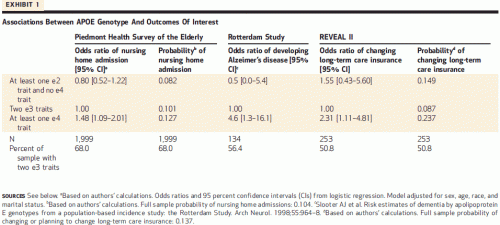One of the reasons that most persons do not purchase private Long Term Care Insurance (LTCI) is the lack of a clear risk signal for need when people are young, and premiums are low. I completed a study with colleagues from Boston University and Duke in which we analyzed the ability of a genetic marker–the APOEe4 (e4) genotype to predict actual nursing home admission (NH) in a community based sample of elderly persons. Could this be a good marker of LTC need?
e4 confers risk for Alzheimer’s Disease (AD). You get a copy from your mom (e2, e3, or e4) and another from your dad. Having at least one copy of e4 greatly increases ones risk of AD, which is not only a leading cause of NH admission, but most persons who develop AD end up in a NH.
We used e4 to predict NH admission in a community cohort of elderly persons living in 5 N.C. counties who were age 65 and over in 1986; they were followed until December 31, 2006 and we assessed whether they were alive, dead or had moved to a NH. We also analyzed the REVEAL II study, a clinical trial that provided e4 genotyping information to those with a first order relative with AD and then observed their behavior, including changes in LTCI and other financial planning.
The two basic findings of the paper are:
- e4 was a good predictor of NH entry in a community based sample. Persons with at least one e4 trait were around 50% more likely to move to a NH during follow up (compared to those with e3/e3, the most common group). The absolute probability of going to a NH ranged from a high of 0.127 for those with at least one e4 trait as compared to .101 for the e3/e3 group and .082 for those with at least e2 copy (shown to be protective against AD).
- Persons who found out they had increased risk of AD (based on e4) were more likely to change their LTCI holdings by increasing coverage. Those with at least one e4 were 2.3 times more likely to make such changes, again as compared to e3/e3.
This is the worst nightmare of a private LTCI company. A risk marker that predicts NH admission that is not used by insurance companies in underwriting, but is increasingly available at a low price to consumers via companies such as 23andme. And there is evidence that at least those with experience with AD (REVEAL II study) respond to this information in a way that moves the market toward adverse selection. In response, it could be expected that insurance companies would increase premiums out of caution, further driving out lower risks, making death spiral all the more likely. The private LTCI market is very weak, and the availability of genetic markers with no policy intervention could make it weaker. There is no reason for optimism that private insurance will play an increasing role in financing LTC.
In a follow up post, I will explore whether the use of genetic markers and the information they provide could be used in a way to expand and improve the market for private LTCI, with a little help.
*************
Donald H. Taylor, Jr., Robert M. Cook-Deegan, Susan Hiraki, J. Scott Roberts, Dan G. Blazer, Robert C. Green. Genetic Testing for Alzheimer’s and Long Term Care Insurance. Health Affairs 2010;1:102-08.
Zick CD, Mathews CJ, Roberts JS, Cook-Deegan R, Polorski RJ, Green RC. Genetic Testing for Alzheimer’s Disease and its Impact on Insurance Purchasing Behavior. Health Affairs 2005;24:1):483-90.

